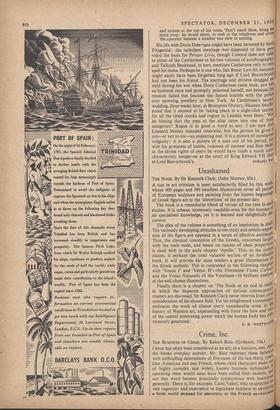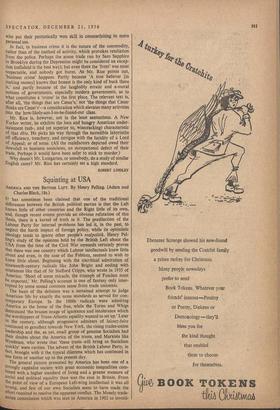Crime, Inc.
THE BUSINESS OF CRIME. By Robert Rice. (Gollancz, 16s.) CRIME has often been considered as an art; as a business, not. Also the books overplay murder. Mr. Rice redresses these balatth5 with enthralling descriptions of five cases of the last thirty year four American and one French, whose chief characters make LI°
n of highly complex and widely known business technique
i operating what would once have been called their rackets, had not that word become practically synonymous with busincsse7 generally. There is, for example, Carlo Valeri, who re-directed his vast ingenuity and experience in legitimate business to satisfying s brisk world dertund for nsrcotics; or the French ex-risistani) who put their patriotically won skill in counterfeiting to more personal use.
In fact, in business crime it is the nature of the commodity, rather than of the method of activity, which provokes retaliation from the police. Perhaps the arson trade run by Sam Sapphire in Brooklyn during the Depression might be considered an excep- tion (celluloid is the best way); but even there the 'front' was most respectable, and nobody got burnt. As Mr. Rice points out, `business crime' happens. Partly because 'A true believer [in making money] knows that honest is the only kind of buck there Is,' and ,partly because of the laughably erratic and a-moral notions of governments, especially modern governments, as to What constitutes a 'crime' in the first place. The relevant text is, after all, 'the things that are Caesar's,' not 'the things that Cesar thinks are Caesar's'—a consideration which elevates many activities into the how-likely-am-I-to-be-found-out class.
Mr. Rice is, however, not in the least sententious. A New Yorker writer, he exhibits the lean and hungry American under- statement (sub-, and yet superior to, wisecracking) characteristic of that elite. He picks his way through the incredible labyrinths Off efficiency, treachery, and intrigue with the lucidity of a Lord of Appeal; or of some. (All the malefactors depicted owed their downfall to business associates, an occupational defect of their trade. Perhaps it would have been safer to stick to murder.)
Why doesn't Mr. Lustgarten, or somebody, do a study of similar English cases? Mr. Rice has certainly set a high standard.
ROBERT LINDLEY



































 Previous page
Previous page